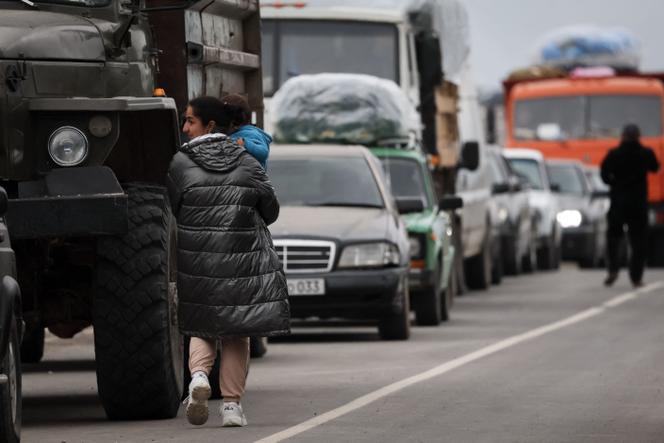


Thousands of refugees from Nagorno-Karabakh streamed into Armenia Monday, September 25, as a deadly blast rocked a fuel depot in the rebel enclave, and Azerbaijan and ally Turkey hailed Baku's victory over the majority ethnic Armenian area. While Azerbaijan showcased its regional alliances, Russia hit back at embattled Armenian Prime Minister Nikol Pashinyan after he blamed Moscow for the swift defeat of the breakaway territory.
An explosion at a fuel depot killed and wounded an unspecified number of people, according to Armenian separatist authorities which have been supplying those seeking to leave the territory with petrol and diesel. "There are dead and wounded as a result of an explosion at a fuel depot near the Stepanakert-Askeran road," the separatist interior ministry said in a statement, adding that "rescuers and medics are working at the scene".
Armenia and Azerbaijan have fought two wars in the last three decades over Nagorno-Karabakh, a majority-ethnic Armenian enclave within the internationally recognized border of Azerbaijan. Azerbaijan launched a lightning operation on September 19 to seize control of the territory, forcing the separatists to lay down their arms under the terms of a ceasefire agreed the following day. It followed a nine-month blockade of the region by Baku that caused shortages of key supplies. The separatists have said 200 people were killed in last week's fighting.
Baku announced two of its soldiers also died when a mine hit their vehicle on Sunday.
Azerbaijan's state media said officials held a second round of peace talks with Nagorno-Karabakh's ethnic Armenian community aimed at "reintegrating" them. But on the road heading to Armenia, more and more residents from the region appeared to be trying to get out as the witnesses said cars were snarling up in traffic.
Turkish President Recep Tayyip Erdogan lauded Baku's "historic success" at a meeting with Azerbaijan's leader Ilham Aliyev in the country's western exclave of Nakhichevan. "The window of opportunity has opened to settle the situation in the region. This opportunity must not be missed," Erdogan said.
Aliyev vowed that the rights of ethnic Armenians in the Nagorno-Karabakh region would be "guaranteed". "Karabakh's residents – regardless of their ethnicity – are citizens of Azerbaijan," he said.
Armenia's premier on Sunday sought to deflect blame for the outcome on long-standing ally Russia, signaling a breakdown in the countries' security pact. In nationally televised comments, the Armenian leader said the security agreements between the two countries had proved "insufficient", suggesting he would seek new alliances.
Moscow on Monday slammed Pashinyan's comments in an angry broadside, accusing the premier of trying to "absolve himself" from responsibility. "The leadership in Yerevan is making a huge mistake by deliberately trying to destroy Armenia's multifaceted and centuries-old ties with Russia," Russia's foreign ministry said. Pashinyan later held a meeting with Russia's interior minister Vladimir Kolokoltsev where he "underlined the importance of consistent cooperation" between law enforcement in the two countries.
Washington said Monday that Russia had shown it is not a reliable partner. "Russia has shown that it cannot be relied on as a security partner," State Department spokesman Matthew Miller told reporters.
Armenia is a member of the Collective Security Treaty Organisation (CSTO) – a Russian-dominated group comprising six post-Soviet states that had pledged to protect each other if attacked. As Russia, bogged down in its own war in Ukraine and refused to come to Armenia's aid, they argued that Yerevan had recognized the disputed region as part of Azerbaijan. Now, Russian peacekeepers– six of whom died in the recent fighting – are helping Azerbaijan disarm the Karabakh rebels.
Pashinyan is under pressure at home from thousands of Nagorno-Karabakh supporters who have been rallying and blocking roads in Yerevan since Wednesday's ceasefire deal. Thousands of opposition protesters filled the main square on Monday for three days of planned disruptions.
